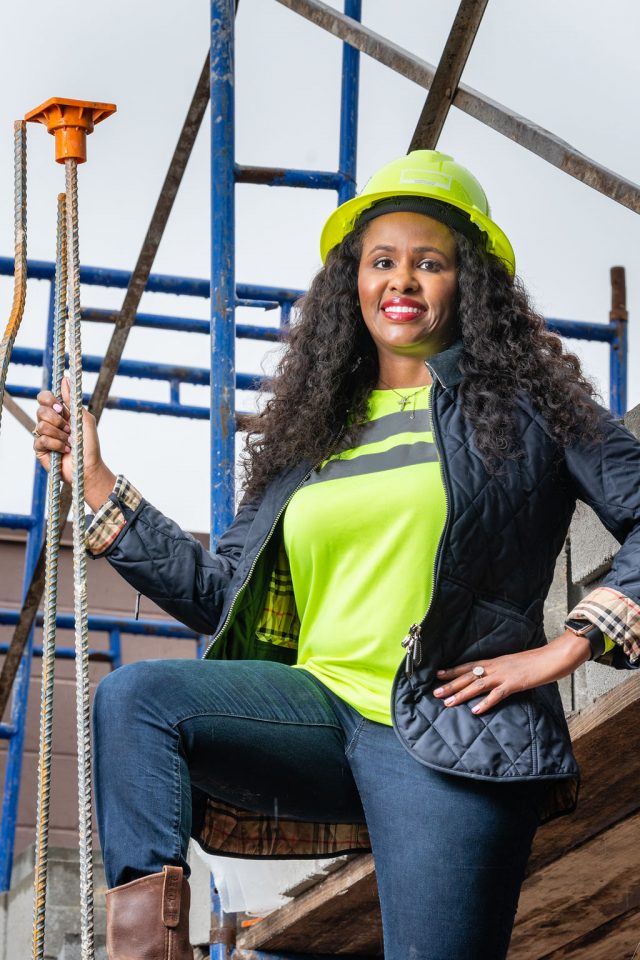By Tatiana Eaves
On November 15 2021, President Biden signed into law the Infrastructure Investment and Jobs Act (IIJA) which makes $1.2 trillion available in funding for infrastructure programs across the energy, water, transportation, and building sectors. Which means in the coming months, U.S. departments and agencies are charged with actually implementing the Act and putting forward guidance defining terms, establishing program priorities, and determining how to distribute the funding.
This presents many opportunities for Birmingham’s community leaders, business owners, and citizens alike. We had the opportunity to speak with two amazing Black women, L’Tryce Slade and Wassa Inoni, who are leading the charge for science, transportation, and other infrastructure development and progress in Birmingham and beyond. We asked them for their perspectives on the impact and opportunities in light of the passage of IIJA.
L’Tryce Slade is the founder of Slade Land Use, Environmental, and Transportation Planning, LLC and a prominent Birmingham community leader. Ms. Slade grew up in a small town in North Carolina with a passion for environmental issues and equity, “Early on as a child, my mom jokes, I’d talk about things like recycling. Well, recycling wasn’t really popular at 5 years old.” Slade jokes. She’s been providing consulting services over 16 years. In her work today, Ms. Slade is also passionate about empowering people and having a positive impact on the community as a whole, “my tagline for my businesses, is that we build more than buildings, we build community,” Slade states.

Wassa Inoni works for one of the top construction companies in the country and is an entrepreneur with over 7 years of experience. She owns a digital marketing company called BIXO DIGITAL, which provides marketing/business development services and training for small businesses. Ms. Inoni grew up in Cameroon in West Africa, travelled to England for high school and university and holds degrees in engineering and cost and project management. “I had a lot of engineers in my family, so I spent a lot of time going out on construction sites” Inoni mentions, “I love puzzles so being able see how something is built from scratch to a whole building has always been fascinating to me, to see how people work together to achieve that”.
With the incoming funds from the IIJA, Ms. Inoni and Ms. Slade have a few ideas and recommendations for what they would like to see happen for people at the community level. “The industry is currently struggling with the lack of skilled labor and material,” Ms. Inoni highlights, “It’s tricky because the infrastructure bill would create a lot more work and projects, but then again it causes problems because as all of these projects kick off, it will increase those issues.”
Ms. Slade brought up similar points about labor and workforce development in light of IIJA funds, “I would like to see green jobs lead the way. There are so many people who maybe can’t afford to go to college, but they can be trained, they are bright, they can learn, they need to be coached,” Slade stated, “there’s a lot of state and federal money that will sponsor trainings that I’ve taken advantage of in the past with my staff, so that’s what I want to see more of.”
Ms. Slade also stated that this bill will help her continue to give back to the Birmingham community, but highlights the need for clear and targeted funding for disadvantaged businesses, “I think we need to make sure that the money and the funds are dispersed equitably to diverse communities and that the people that live in those communities are at the table with the power to change their economic situation”.
Ms. Inoni also highlights the need for federal agencies to start at the community level, involving community members early in the process, providing training resources that are easily accessible to people, “the information has to also be brought to the people, because it’s so vast that it’s hard to go out and look for the information on your own”.
She states that changing how we think about solving problems as a whole is required, along with making workforce trainings available for others that are aspiring to enter into the field or to starting their own businesses. “As young black females, we are constantly expected to go beyond what’s required and be creative. Solve problems that you already see existing. Create change to make life easier.” She adds, “That’s why I believe with this legislation presents unique opportunities for change, either as a skilled worker or by providing services. Either way, we’d be expected to do things differently and adapt to marketing ourselves by providing value beyond what is expected”.
We’ve done the hard work to pass the IIJA, but it is now a priority to push policymakers and agency heads to ensure that equity is cemented into both the projects that are implemented and the process by which that implementation takes place. L’Tryce Slade and Wassa Inoni are two people leading this charge on the ground, but in order to make this work for the community, it will take all of us.





